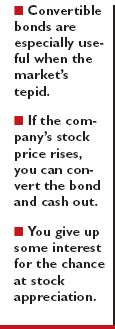Article
Investment Consult
Convertibles: The best of both worlds

Convertibles are corporate bonds that pay interest and have a maturity date like regular bonds. But unlike regular bonds, they let you convert the bond to shares of the company's stock, typically at your discretion, and sometimes at a predetermined price. A convertible bond's description might read: GenCorp 5¾s Ao15 2007. That means you'll get 5¾ percent annual interest, paid on April 15 and October 17, and the bond matures in 2007.
If a company's share price goes way above what you'd get at conversion, and you make the switch, you've hit pay dirt. On the flip side, if the share price drops or goes nowhere, you can hang onto the bond and merrily keep cashing the interest checks. So you've got profit potential on the upside and some protection on the downside.
I tell clients that convertible bonds are great for conservative investors who still want some sort of equity play, and for people who want a portion of their portfolio invested in assets that don't directly correlate with the market. Convertible bonds don't fully correlate with either stocks or bonds, because yield, convert price, interest rates, and numerous other factors affect their price and desirability.
Because of the interest they pay, convertible bonds are also useful when you don't expect the market to bring any great returns-and it's no secret that the markets are pretty sluggish right now.
By the way, don't confuse convertible bonds with convertible preferred stocks. The latter are similar in approach to convertible bonds, but convertible preferred stocks usually pay a dividend instead of interest, typically have no maturity date (since they're not bonds) and are of lower ranking than the company's bonds.
All this praise for convertible bonds begs the question: If they're so wonderful, why ever bother with regular bonds?
For one thing, it's sometimes the smaller, more volatile companies that issue convertibles, which is something you'll need to be mindful of. And, in general, you'll get a lower "coupon" (interest rate) than you'd get with ordinary bonds. You're essentially paying a premium for the conversion feature, which gives you a shot at the brass ring of stock appreciation.
In addition, convertible bonds are subordinate to other company debts. So if the company files for bankruptcy, holders of the company's regular bonds, and any debt secured by collateral, get paid before convertible bondholders. Still, you're higher in the payment pecking order than common stockholders.
You should also be aware that most convertible bonds are callable. This means the company that issued them can force you to either sell the bonds or convert them to stock whenever it chooses.





